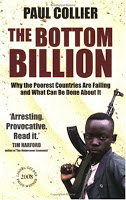
Subtitled: Why the Poorest Counties are Failing and What Can Be Done About It
Basically, this guy thinks that most peoples’ lives in the developing world are getting better (eg Brazil etc). However, there are about a billion people in the poorest countries whose lives are not improving at all and show no signs of improving. He thinks aid etc should be focused almost entirely on this relatively small group of countries, and its a matter of habit/culture that development assistance is not focused that way.
He argues that these countries are stuck in poverty because of one of more of these traps: conflict, massive natural resources, being landlocked with bad neighbours, and bad governance. He suggests various measures which include assisting elites in these countries to turn things around (by for example producing model charters that can be easily adapted), military intervention (eg Sierra Leone, which was a huge success for British military intervention – saved many lives – and never gets talked about), and removing trade barriers.
He has some amusing things to say about the current state of aid work, pointing out that one reason for the focus outside the bottom billion is that everyone would rather be posted to Rio than Bangui. He spends quite a lot of time bashing on Bangui (extra points if you know where that’s the capital of?). Apparently the World Bank doesn’t have a single person stationed there, though it’s one of the poorest countries in Africa (little clue there for you).
His arguments seem to have plenty of merit, but it’s hard to tell, as I know very little about eg. international trade law, and he doesnt really present the other side of the question at all. Which makes one a little dubious. One feels even more dubious when he declares that the economics department of one university is either niave or ‘has been infiltrated by Marxists.’ What the hell does that mean? ‘Infiltrate’ is quite sort of emotionally laden and Cold War, but it’s better than Marxist! Who even uses that word any more? Why doesn’t he just say . . . has a generally leftist view’ or something.
He tells some sad stories. In 2004, a study was done to see how money was spent in rural clinics in Chad. What the study found was, don’t worry about how it’s spent, less than 1% of it even gets to the clinics in Chad – the rest is pilfered by various officials as it leaves central government. Nice.
